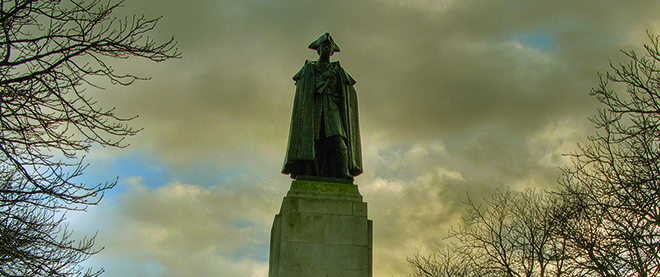1812: A perfect war for politicians
The War of 1812 is Canada’s only fully inclusive, federalism-friendly conflict
Steve Eberle/Flickr
Share

War is hell, of course. But the War of 1812 also happens to be perfect. At least from Ottawa’s perspective.
Consider the federal government’s recent video promoting the war’s bicentennial. “Two hundred years ago the United States invaded our territory,” intones the narrator as red-coated soldiers march and shoot in formation. “We stood side by side and won the fight for Canada.” This short, stirring clip, playing in movie theatres and in frequent rotation on television, makes a virtue of Canadian patriotism and military success and brings focus to bear on four heroes from the conflict: Maj.-Gen. Sir Isaac Brock, native leader Tecumseh, Ontario settler Laura Secord and Lt.-Col. Charles de Salaberry of Quebec.
The one-minute film is not without its critics, however. Carleton university professor Andrew Cohen objects to its “jumped-up jingoism” and militaristic focus. The real legacy of the War of 1812, Cohen wrote in the Ottawa Citizen, is that Canada and the U.S. “developed a tolerance for each other.” And tolerance, of course, is the great Canadian virtue.
Yet Cohen, and others opposed to current bicentennial efforts, overlook how typically Canadian the war is being presented by Ottawa. Our four familiar heroes—Brock, Tecumseh, Secord and de Salaberry—will also be featured on a set of four new quarters to be issued by the Royal Canadian Mint, and on new stamps from Canada Post. The fact that they are, respectively, an anglo, a native, a female and a Quebecer gives Ottawa’s marketing efforts the kind of racial, linguistic and gender inclusiveness that every government brochure, poster and ad campaign inevitably strives for. Even better, all four official heroes were engaged in tackling the same problem—nasty invading Americans. This makes it Canada’s first and only fully inclusive, politically correct and completely federalism-friendly conflict.
There’s no question the War of 1812 was a seminal event in our country’s history. But its camera-friendly optics no doubt help explain the eagerness of Stephen Harper’s government to promote its bicentennial. How else to comprehend Ottawa’s complete lack of interest in other equally worthy figures and fights from our past, such as Maj.-Gen. James Wolfe and the Battle of the Plains of Abraham in 1759?
The historical similarities between Brock and Wolfe are many and significant. Both wrested victories from improbable odds and died on the battlefield to instant glory. Church bells rang across Britain when Wolfe took Quebec City and delivered all of North America into British hands. Similarly, Brock was the toast of the empire for turning back two American invasions in 1812. Their achievements were both memorialized in art and geography—Brockville and Wolfe Island in Ontario being two obvious examples—and towering monuments were later raised to each soldier.
In time, both men also became political targets. The first monument raised to Brock at Queenston, Ont., was bombed in the aftermath of the 1837 rebellion. Wolfe’s monument was repeatedly defaced by sovereignists who held him responsible for the English conquest over French Quebec.
Which brings us back to how history is remembered in Canada today. The 200th anniversary of Brock’s triumph has been lavished with federal attention and funds in part because it can be argued French, English and native Canadians all worked together in common cause. (This also explains the little-known de Salaberry’s sudden rise to fame.) On the other hand, the 250th anniversary of Wolfe’s victory in 2009 was comprehensively ignored by the Harper government for fear of stoking nationalist outrage in Quebec. There were no stamps, coins, re-enactments or promotional videos for Wolfe; he became instead an historical nonentity.
This politicization of our history is a greater shame given that Wolfe is as responsible for establishing Canada’s modern identity as anyone. Prior to attacking Quebec City in September 1759, he laid out his “articles of capitulation”—the terms he intended to impose on the French if he won. Key among these was Wolfe’s declaration that “there shall be no innovations in religious matters or any interruption of Divine Service, as it is now preach’d in the colony.” Coming at a time of virulent anti-Catholicism across British North America, such willing acceptance of the French-Canadian way of life was entirely unexpected. Wolfe’s posthumous order, it can be argued, thus represents the origin of that unique sense of Canadian compromise that has allowed French and English culture, law and language to coexist and thrive side by side ever since.
That ought to be worth a stamp. Or at least a quarter.